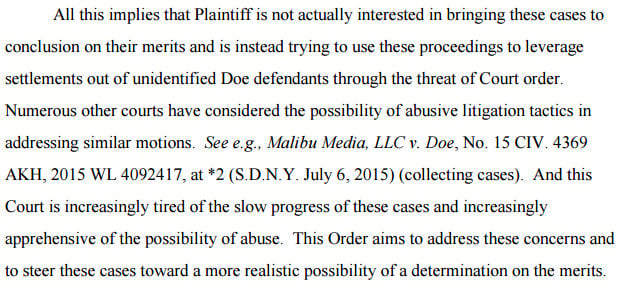The makers of Dallas Buyers Club have sued thousands of BitTorrent users over the past two years.
Many of these cases end up being settled for an undisclosed amount. This usually happens after the filmmakers obtain the identity of the Internet account holder believed to have pirated the movie.
Not all alleged downloaders are eager to pay up though. In fact, many don’t respond to the settlement letters they receive or claim that someone else must have downloaded the film using their connection.
This presents a problem for the filmmakers, who need to gather additional evidence to prove guilt. In several recent cases they even went through social media profiles of defendants and Google map images of their neighborhoods, for example.
In addition to this info Dallas Buyers Club want to speak to the accused directly so have asked the court to grant dozens of depositions. This would help to determine who the true pirates are, they argue.
The request covers five active cases with 61 IP-addresses which have yet to respond or settle.
The court carefully reviewed the request and in an order late last week U.S. District Court Judge Richard Jones denied the depositions.
In his order (pdf) the Judge writes that depositions are meant to “discover relevant information” but he doubts that Dallas Buyers Club intends to take any of these cases to trial.
When the filmmakers were allowed to depose people in a previous case it didn’t result in the naming of any defendants.
“All this implies that Plaintiff is not actually interested in bringing these cases to conclusion on their merits and is instead trying to use these proceedings to leverage settlements out of unidentified Doe defendants through the threat of Court order.”
Instead, the depositions may be used as a pressure tool, which would be a clear sign of abuse.
“Numerous other courts have considered the possibility of abusive litigation tactics in addressing similar motions. And this Court is increasingly tired of the slow progress of these cases and increasingly apprehensive of the possibility of abuse,” Judge Jones adds.
The Judge admits that depositions may often be helpful, but notes that Dallas Buyers Club wouldn’t be in any better position if the defendant denies being the primary infringer during the deposition.
The filmmakers already have the name and address of the account holders, and should make their case based on this information, the order concludes.
While there’s no direct accusation the mention of possible abuse and the growing impatience with the many Doe lawsuits is a clear blow for the movie studio.
For their part the accused pirates can chalk up a win as they have been saved from having to go through an ‘interrogation’, a potentially threatening and intimidating process.


 The makers of Dallas Buyers Club
The makers of Dallas Buyers Club 




